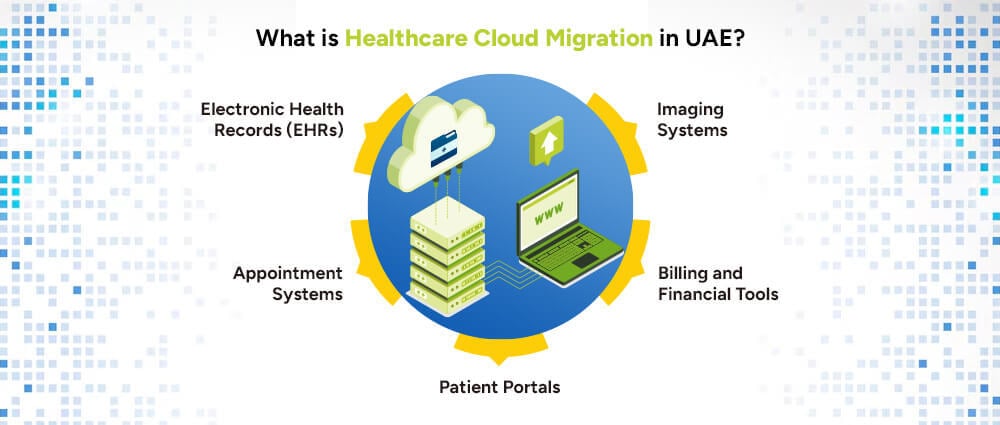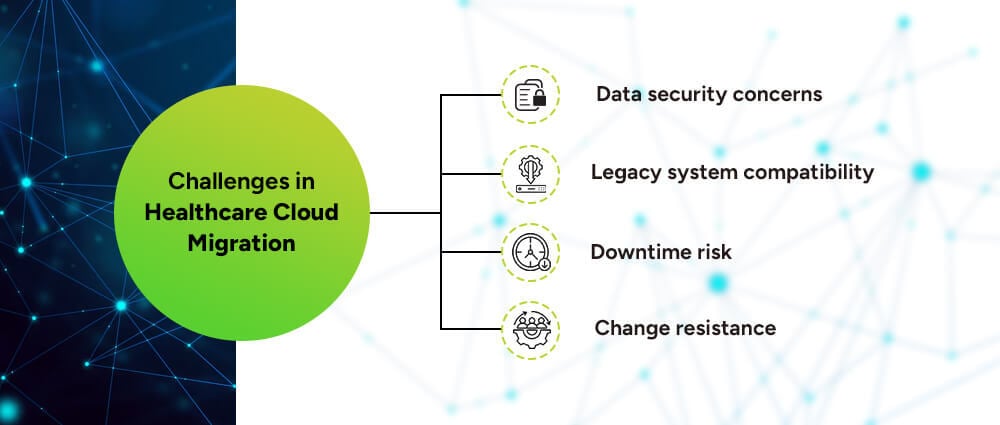If you’re part of a healthcare organization, you’ve probably heard the buzz around healthcare cloud migration in UAE. Everyone seems to be talking about going “cloud-first,” but what does that mean in the healthcare world? And more importantly; how do you make the transition without disrupting care?
Today, we are here to walk you through healthcare cloud migration and its benefits and challenges in healthcare. It will include a foolproof strategy to help an organization planning to migrate to cloud architecture effectively. Whether you’re an IT person or a healthcare executive or just someone curious about the subject, you will find everything in simple, no-jargon language..

In the rise of cloud-based services for healthcare, the main idea remains the transfer of all data, applications, and processes from physical on-site servers to a properly secured cloud infrastructure. In effect, this means a transfer from the sweatshop of an office into a much smarter, better-managed, scalable, efficient, and accessible virtual workplace. In the cloud space, this is the effortless role of cloud managed services, that act like your movers.
This can include migrating:
Like the economy, the UAE is developing into an increasingly modern healthcare center. Programs such as the UAE Digital Health Strategy 2023-2030 aim to make healthcare more effective, data-driven, and patient-centric. The migration of the hybrid cloud for healthcare in the UAE serves to fulfill this vision via the safe sharing of information, speedy delivery of service, and AI-infused analytical insights.
Here are the 7 benefits of cloud migration for healthcare that are convincing hospitals and clinics across the UAE to make the move:
Doctors, nurses, and staff can access patient information anytime and from anywhere. This makes it easier to make quick and informed decisions. It also supports remote consultations and faster care delivery.
Healthcare providers don’t need to invest in expensive servers or IT infrastructure. With cloud services, you only pay for what you use. This helps reduce overall costs and improves budgeting.
As the hospital grows, cloud resources can easily grow with it. If less capacity is needed, it can also be scaled down. This flexibility helps manage resources without wasting money.
Top cloud providers use strong encryption, cloud cryptography, and multiple layers of protection. They follow strict healthcare regulations to keep data secure. This ensures patient information stays private and safe from threats.
Cloud systems automatically back up data and have recovery plans in place. If there’s an outage or cyberattack, data can be quickly restored. This prevents loss of critical medical records.
Medical teams across departments or cities can share files and updates instantly. This real-time access helps them work together more smoothly. Better collaboration leads to better patient care.
Cloud platforms make it easier to use advanced tools like AI for diagnosis. They also help analyze large volumes of data for trends and planning. This improves healthcare quality and decision-making.

Of course, no transition is without bumps. Here are some common hurdles that companies face when they are thinking to migrate to cloud architecture in healthcare:
Patient data is sensitive and protected by law. You’ll need to ensure full compliance with UAE regulations and international standards.
Old systems may not be cloud-ready, requiring customization or replacement.
If not managed well, migration can lead to temporary service disruptions.
Staff training and support are crucial to get everyone on board.
To ensure a smooth transition, here’s a simplified cloud migration strategy for healthcare providers in the UAE:
there are three steps to access and planning within a healthcare cloud migration platform:
Look for platforms experienced in cloud migration healthcare services like Microsoft Azure, Amazon Web Services (AWS), and Google Cloud are some top names.
Pilot with low-risk applications to test and refine your process before going full-scale.
Work with providers that specialize in healthcare website migration to cloud services to securely transfer data without loss or corruption.
Conduct training sessions for both IT teams and medical staff to get comfortable with the new healthcare cloud systems.
After migration, continuously monitor performance and make necessary improvements.
Cloud migration for healthcare IT is more than simply a technological advancement; it’s a radical change in the way that care is provided. And now is the ideal moment to make the change in a progressive nation like the United Arab Emirates.
You can guarantee a successful, safe, and seamless cloud migration with the correct plan, partners like Arpatech, and assistance, eventually improving the experience for patients and healthcare providers.
Because it offers cloud cost optimization, better data access, enhanced security, and the ability to use AI and analytics for better patient outcomes. It’s all about being faster, safer, and smarter.
Cloud is used for storing electronic health records, telemedicine platforms, managing appointments, medical imaging, billing, and even AI-driven diagnostics. It’s the digital backbone of modern care.
Data migration in healthcare refers to securely transferring patient records, clinical systems, and other digital assets from older systems or on-premise setups to cloud-based solutions.
Popular choices include:
The best one depends on your specific needs and budget. It’s smart to consult cloud consulting companies for healthcare providers before making a decision.